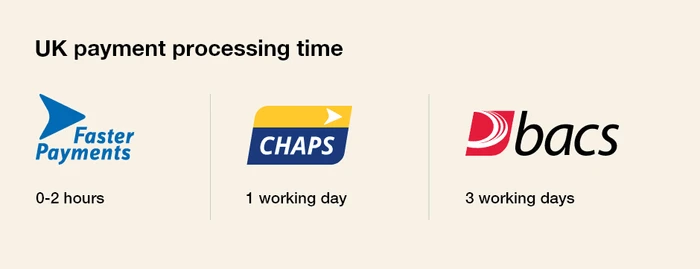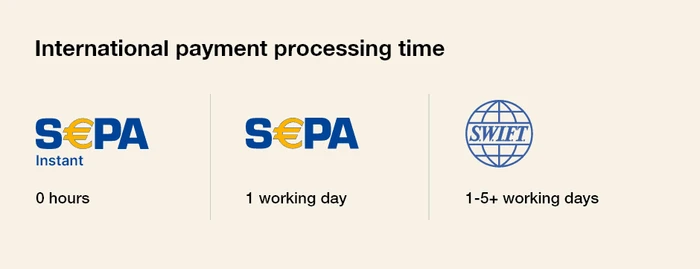How long does a bank transfer take?
You’ve probably noticed that some bank transfers are quicker than others. So how do you know when your recipient is going to receive the funds you send them? In this article we tackle how long it takes for a bank transfer to reach its recipient – and several related questions about online banking you might find useful.
What do you need to make a bank transfer?
Let’s start with the basics – to make a wire transfer through your bank account you need to collect some account details from your recipient. There can be more or less information required depending on the type of payment you’re planning to make.
The minimum information you will need is your recipient’s eight digit account number, name and a bank identifier code which can be in a BIC/SWIFT, sort code, routing number or another format depending on the region. Sometimes you will need to state bank address too.
And don’t forget to write a payment reference when you make a bank transfer!
How long does a bank transfer take in the UK?

Local payments in pound sterling within the UK can be sent via Faster Payments, CHAPS or Bacs networks. Most payments under £1 million are sent via Faster Payments – they are very quick and generally it takes up to two hours.
Bacs and CHAPS are typically used for transferring large amounts of money between UK banks – they are more costly, and their processing time is longer as such payments go through more lengthy and thorough compliance checks. CHAPS is usually processed on the same day while Bacs take 3 days.
At MultiPass Faster Payments are processed instantly 24/7.
International Transfers

The time of your international bank transfer execution depends on the payment method you are using, which you personally or your bank chooses for your payment.
SEPA – although considered a local payment network in the Eurozone, it still connects 36 different countries. Standard euro transfers between SEPA zone participants in Europe take 1 day. If both sender bank and recipient's bank are also members of the SEPA Instant network, these payments will be received immediately.
SWIFT – this is the most common international transfer method in different currencies. SWIFT network often passes multiple banks before reaching their destination, that is why they can arrive in 1-5 business days.
Execution Time
Your bank may provide you with different options to send money – standard or priority.
Standard payments
As we already covered above, standard payment execution time varies depending on whether the payment is local or international, business or personal, high-value or low-value. Most local payments are usually delivered within the same business day.
However, there can be delays. A 1-day transfer delay will happen in case the payment is launched after the bank’s cut-off time. For example, if the bank’s cut-off time is 16:00, any payment made after this time will be executed on the next working day. These bank transfer delays can also happen on weekends and public and bank holidays as most banks only process payments Monday to Friday.
You can check MultiPass cut-off times here.
Express payments
International transfers sent via SWIFT can take up to 5 working days. If you need to make sure your recipient gets paid as soon as possible, you can ask your bank or provider for an express payment. This way it will be prioritised; however, you will be charged an extra fee. Although this is not a very popular service for day-to-day personal transfers, it is quite demanded amongst businesses.
Is it faster to send money between two different banks versus the same bank?
The speed of your transfers can be also affected by whether the person or a company you’re paying has an account in the same bank or payment institution as yours or not.
If your recipient's bank is the same, the transfer will be either instant or happen within the same day. If they have a different bank, then standard payment time applies, depending on the payment method chosen.
If you regularly transfer money to the same recipients, and time is of the essence, you may consider opening accounts in the same bank. The transfer between the same bank accounts is faster because the money does not have to go through intermediaries such as automated clearing houses, for example. It means your funds pass fewer participants thus saving you time.
Transfers between your accounts
If a customer has more than one account within the same bank, the money transfer between them is usually either very quick or instant. For example, the transfers between your own business accounts within MultiPass are immediate and can be performed 24/7.
Aren’t bank transfers instant?
It depends on your country of residence and the destination of your payment. Local transfers within the same country are often instant, however, not all the banks are members of instant payment networks. If you are paying your friend living in the same country, the payment should not take more than 24 hours.
Frequently Asked Questions
Do money transfers happen on weekends?
You can make bank transfers over the weekend in your internet bank, however, most probably they will be processed on Monday unless they are instant payments. They go through automatic compliance checks and require no staff interference.
What to do if a bank transfer is not received?
If your money was transferred but not received on the other side, do not worry. Sometimes the transfer execution may take a few days longer than anticipated, especially if we’re talking about international transfers.
Banks can also hold your payment for additional compliance checks if your payment amount is larger than usual or they detect any suspicious activity in your bank account. There's no reason for concern – as long as you’re not committing crime, your bank is obliged to inform you in the unlikely case your payment fails to be processed and credit the money back to your bank account.
How long does a pending transaction take?
The transaction may be pending from a few hours to 5 or more days, depending on the payment method chosen. See above to check their standard processing time. You can also contact your bank or payment service provider to request a status update on your payment.
Can I get my money back from a bank transfer?
Your online payment can be cancelled at your wish if it hasn’t already been processed. Contact your bank as soon as possible if you made a payment by mistake or notice an unauthorised one.
Do bank holidays affect transferring money?
Banks can be open on the bank holiday, but it's essential to double-check before sending money. Banks may work differently – some will send the money on the same date, and some online bank transfers might be delayed and sent only on working days.
Conclusion
So, how long does a bank transfer take? Ultimately, your bank transfer execution time depends on many factors.
If you’re looking for ways to improve your payment delivery speed and make sure your suppliers and partners always get paid on time, contact MultiPass. 98% of MultiPass business payments are processed within 24 hours.
98% of MultiPass business payments are processed within 24 hours